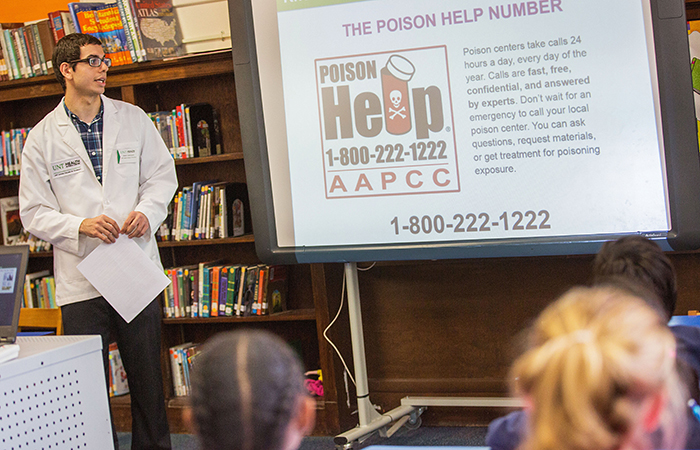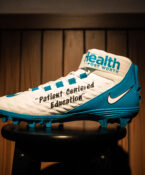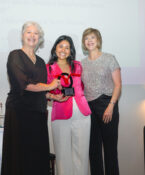Lessons to keep kids safe
By Jan Jarvis
After listening to a presentation on over-the-counter medicine safety, 10-year-old Kamila Allen was confident she could make the right choices the next time she needed relief from a cold.
“You should never take over-the-counter drugs by yourself because you could end up in the hospital,” she said. “You should go to the pharmacy and get the right medicine.”
It’s a good thing that Kamila was listening closely to the presentation by UNT System College of Pharmacy students.
Although children should be supervised when taking medications, research shows they typically begin self-medicating around age 11, said Loralee Phillips, a UNT Health Science Center pharmacy student who presented the program recently to Kamila and other students at North Hi Mount Elementary in Fort Worth. The children attend the Clayton Youth Enrichment Services afterschool program, a non-profit organization servicing school-age youth.
The presentation, sponsored by the American Pharmacists Association – Academy of Student Pharmacists, was created with fifth- and sixth-graders in mind. It was adapted from programming provided by the Scholastic Book Company, McNeil Pharmaceuticals and the National Poison Control Centers.
“The result of self-medicating at such a young age can be medication errors and misuse, especially when using combination products with the same active ingredients,” Phillips said. “I feel we’re really teaching a foundation of medication safety knowledge for these children to use forever, once they reach the appropriate age.”
In 2013, America’s poison centers managed more than 250,000 exposure cases involving children ages 6 to 19. More than half of these cases involved medication errors and misuse.
The presentation introduced the children to the importance of reading the Drug Facts label, using dosage devices, identifying active ingredients, and storing medicine safely.
Phillips decided last fall that she wanted to get the program into all 85 Fort Worth ISD elementary and middle schools. So far she has presented it to about 260 children at nine schools. She and other UNTHSC pharmacy students plan to reach another 120 children by the end of the school year.
Dennis Roman, 10, said he got a lot from the presentation.
“I learned that taking medicine is important because it makes you feel better,” he said. “But sometimes medicine can also make you sick.”







Social media